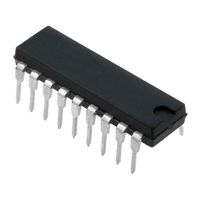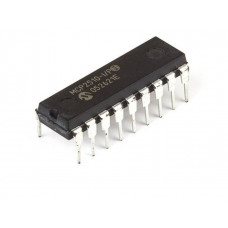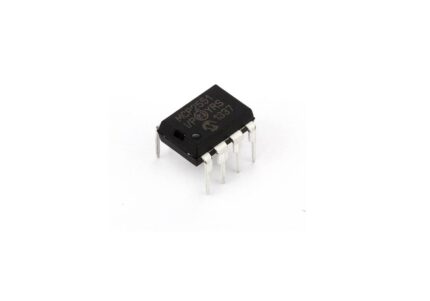MCP23S17 16-Bit Input/Output Expander with I2C Interface IC DIP-18 Package
The MCP23S17 device family provides 16-bit, general purpose parallel I/O expansion for I2C bus or SPI applications. The two devices differ only in the serial interface:?MCP23S17 ? SPI interface??The MCP23X17 consists of multiple 8-bit configuration registers for input, output and polarity selection.
MCP2510 CAN Controller
The MCP2510 provides immediate CAN support across the entire breadth of Microchip?s 100 PICmicro? microcontrollers, providing a seamless migration path and maximum design flexibility for CAN designs. The?MCP2510 CAN Controller?contains on-board features, such as interrupt capability, message masking and filtering, message prioritization, multi-purpose I/O pins, and multiple transmit/receive buffers which significantly offload the microcontroller overhead required to handle CAN message traffic. Applications for the MCP2510 include motor control, smoke detectors, CO detectors, sensors, meters, automotive electronics, climate control and instrument clusters.
MCP2510 CAN Controller Interface IC DIP-18 Package
The Microchip Technology Inc. MCP2510 is a Full Controller Area Network (CAN) protocol controller implementing CAN specification V2.0 A/B. It supports CAN 1.2, CAN 2.0A, CAN 2.0B Passive, and CAN 2.0B Active versions of the protocol, and is capable of transmitting and receiving standard and extended messages.
MCP2515
Microchip Technology?s MCP2515 is a stand-alone
Controller Area Network (CAN) controller that implements the CAN specification, Version 2.0B. It is capable
of transmitting and receiving both standard and
extended data and remote frames. The MCP2515 has
two acceptance masks and six acceptance filters that
are used to filter out unwanted messages, thereby
reducing the host MCU?s overhead. The MCP2515
interfaces with microcontrollers (MCUs) via an industry
standard Serial Peripheral Interface (SPI).
MCP2515 CAN CONTROLLER
Microchip Technology?s MCP2515 is a stand-alone?Controller Area Network (CAN) controller that?implements the CAN specification, version 2.0B. It is?capable of transmitting and receiving both standard?and extended data and remote frames. The MCP2515?has two acceptance masks and six acceptance filters?that are used to filter out unwanted messages, thereby?reducing the host MCU?s overhead. The MCP2515 CAN Controller?interfaces with microcontrollers (MCUs) via an industry?standard Serial Peripheral Interface (SPI).
MCP2515 CAN Controller Interface IC DIP-18 Package
MCP2551
Microchip Technology?s MCP2515 is a stand-alone
Controller Area Network (CAN) controller that implements the CAN specification, Version 2.0B. It is capable
of transmitting and receiving both standard and
extended data and remote frames. The MCP2515 has
two acceptance masks and six acceptance filters that
are used to filter out unwanted messages, thereby
reducing the host MCU?s overhead. The MCP2515
interfaces with microcontrollers (MCUs) via an industry
standard Serial Peripheral Interface (SPI).
MCP2551 CAN transceiver
The?MCP2551?is a high-speed?Controller Area Network?(CAN), fault-tolerant?device that serves as the interface between a?CAN?protocol controller?and the physical bus. The MCP2551?device provides differential transmit and receive?capability for the CAN protocol controller, and is fully?compatible with the ISO-11898 standard, including 24V?requirements. It will operate at speeds of up to 1 Mb/s.
Typically, each node in a CAN system must have a?device to convert the digital signals generated by a?CAN controller to signals suitable for transmission over?the bus cabling (differential output). It also provides a?buffer between the CAN controller and the high-voltage?spikes that can be generated on the CAN bus by?outside sources (EMI, ESD, electrical transients, etc.).
MCP2551 CAN Transceiver IC DIP-8 Package
The MCP2551 is a high-speed CAN. fault-tolerant device that serves as the interface between a CAN protocol controller and the physical bus. The MCP2551 device provides differential transmit and receive capability for the CAN protocol controller, and is fully compatible with the ISO-11898 standard, including 24V requirements.



















